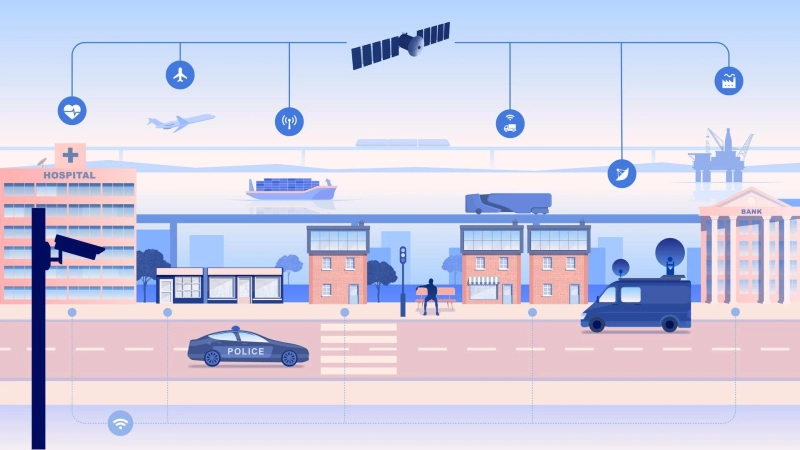Samsung is rumoured to be the next tech giant to offer satellite smartphone connectivity for emergencies. Samsung has already done a lot of work in the field and will incorporate its own range of satellites into some models of its phones. Although satellite connectivity sounds like a dream come true for those with no hope or access to electricity or clean drinking water, it poses some concerns. It may be a lifeline in the midst of a crisis, but it may also be the cause of an even bigger disaster.
Samsung is putting itself on par with Apple and Huawei regarding satellite connection. Samsung has filed a patent explaining how a satellite connects multiple devices. The patent describes how the technology will work and shares plans of having 500-1000 satellites in orbit by 2025. This can potentially mean that every Samsung device will be able to connect with each other through a satellite. Once in orbit, the satellites will be connected to 5G or LTE networks, sharing data among themselves and transmitting it back to earth. This could be a lifesaver in many situations where data connections are down or unavailable.
The company is also working with foreign partners to improve the efficiency of the technology. According to a report in The Korea Herald, Europe may be one of those partners. Its unnamed sources claim that Samsung\'s European base of operations has secured satellite business from mobile and internet companies in the region. This can potentially mean that European consumers may soon have access to high-quality internet, even where regular data connections are unavailable.
Samsung is already a big player when it comes to 5G technology, but satellite connection is new for them, as well as for other tech giants like Apple, who ventured into this field not long ago. Apple completed its first launch of its V-band satellites in June 2017. On the other hand, Google is already offering its own satellite internet service in select parts of rural America.
"Internet is a fundamental need of human beings, and if large corporations offer it as an off-line backup solution through small \'rover\' satellites, they could create a lot of goodwill. But, more importantly, they could gain the support of millions of people who are looking for a way to be able to communicate with their loved ones in the event of an emergency situation," said Matt Wallaert, CEO and founder at Orbital Media Inc., a satellite-related investment company.
It is important to remember that Samsung has also filed patents for other satellite-related technologies like using space stations as communication sources or using satellites for high-speed internet, or even transmitting signals through cell towers. There is still a long way to go until this technology becomes the norm. Much work needs to be done to improve the efficiency of satellite internet and make it more accessible for everyone. However, it\'s a good sign that companies like Samsung are investing much in this field.
How does this work?
Satellite-based connectivity has become a very popular way to keep in touch with faraway friends and relatives. There are, however, other benefits to using satellites for communication – the most prominent being that satellites are secure and have a narrow range.
Modern smartphones have GPS (Global Positioning System) capabilities inbuilt thanks to their powerful Exynos 990 chipsets. This enables them to determine their location on the earth\'s surface, along with being able to calculate their speed and direction of travel. Once these features are enabled on a smartphone, an internet connection is required in order for your phone to be able to communicate with other devices via a satellite network.
The most popular satellite connectivity technology is known as the Globalstar network. This network uses a series of small, low-powered satellites that are able to orbit the earth and transmit signals to your smartphone.
Is this different from mobile internet connectivity?
In some ways, it is similar – but in other ways, it differs significantly. With mobile internet, your smartphone is able to connect to cellular networks in order for you to access data. With satellite connectivity, a connection through a satellite network is required for your device to communicate with other devices via satellites.
Mobile internet is more expensive than satellite connectivity. This is due to the difference in protocol and data usage for each type of connection. Each country has its own mobile network operators, and these companies will charge you a fee for accessing their services. Many mobile network operators also charge you a fee for using the internet on your phone, so the total cost of being connected can be very high. If you are travelling abroad, temporarily or permanently, additional data charges may apply because of roaming fees set by your home network operator.
Because of the difference in technology between satellite connectivity and mobile internet connections, both have varied levels of security. With satellite connectivity, your smartphone is able to connect to other devices via an extensive network of satellites. Therefore, the connection is more secure than using mobile internet, because it puts less strain on your phone\'s hardware and software.
0


